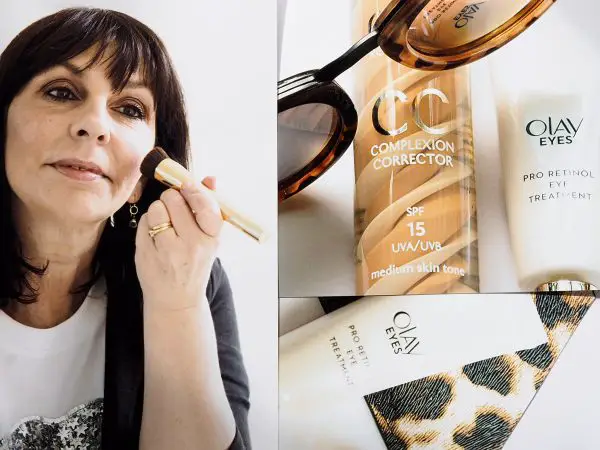I get asked about retinol products more than any other across the entire skin care category. There’s still so much
confusion about this ingredient that has transformed over the years from being seen as a ‘hard core’ dermatology treatment to an every-day, safe to use ingredient. In a bid to get the very last word on the subject, I headed to
the top and spent time chatting with Dr Frauke Neuser, Olay’s Principal Scientist. Olay introduced retinol into their products this March with Olay Eyes Pro-Retinol Eye Treatment and needless to say, it’s selling a storm to those wanting to smooth and freshen the eye area.

I canvassed BBB readers on Twitter to ask what they needed to know about retinol and got so many questions! Dr Frauke (above) has answered them all so now, if you do want incorporate it into your routine, you’ll be armed with all the information you need.
1. What is Retinol? Retinol is one compound in a larger group of similar molecules that are variations of Vitamin A. The key ones are Retinoic Acid, Retinal, Retinol and Retinyl Esters. The umbrella term for all is Retinoids.
2. How does Retinol communicate with skin? All Retinoids are first converted in the skin to retinoic acid, which then docks onto very specific molecular receptors (known as the ‘lock and key’ principle). This unlocks multiple chain reactions inside the skin cells, including increased production of collagen, increased epidermal thickness and turnover.
3. How will my skin benefit from Retinol? The communication mechanisms (above) translate into visible
smoothness, reduction of lines and improved skin firmness.

4. Isn’t readily available retinol less effective than
prescription? Potentially – it depends on the concentration and formulation. Olay uses a gentle Retinyl Propionate which combined with other ingredients such as Niacinamide and peptides, has been proven in a published clinical study to have the same efficacy as prescription Retinoic acid. It’s difficult to generalize because there are many Retinol product variants.
5. Is retinol safe to use daily?
Yes!
6. Where in my routine should I use a retinol product? Ideally at night – in either a serum or a cream format.
7. Can I only use Retinol at night? No, but it depends a bit on the exact formula with what other ingredients the Retinol is formulated with. Every Retinol product varies so you should be vigilant with the instructions
you’re given.

8. How soon will I see a difference in my skin? The surface effects on the epidermis such as cell turnover
leading to smoothness can start showing up within days, while the deeper dermal effects that show line reduction will take several weeks or even months. It will, of course, depend on the condition of your skin to start with.
9. Can Retinol burn, sting or irritate my skin? There’s no doubt that Retinoids can be irritating and it’s going
to be different for every person. The most irritating form of retinol is Retinoic acid, while the most gentle type is Retinyl esters. Dermatologists often recommend you allow your skin to get used to Retinoids slowly, so perhaps only use it every couple of days and slowly increasing the frequency.
10. Do you still need to build up to stronger retinols or can you dive straight in at a high strength?
It depends on your skin type, and only you will know how it generally reacts to new ingredients. If your skin deals well with irritation, you may be fine with a higher strength, but if not, start low or with ‘gentle’ Retinols such as the esters mentioned above.

11. Can you use too much Retinol? Yes, you can. If you overly irritate your skin, inflammation can occur, which in turn has been shown to contribute to skin ‘ageing’.
12. Should I still exfoliate when I’m using a Retinol product? It depends a bit upon your skin type and how you react to Retinol. Only exfoliate if your skin isn’t red or irritated.
13. Are there any skin types that shouldn’t use Retinol? Very sensitive skin can become irritated more easily – if you experience heat, redness or flaking, stop using it!
14. Is Retinol safe to use while pregnant? In theory, yes, but if you have any doubts, check with your doctor.
15. Is retinol a winter only product because of the sun sensitivity issue? No, it’s fine to use at all times of the year but please do make sure you wear SPF every single day.

16. How does Retinol affect other skin damage conditions such as pigmentation? It can definitely help if the hyperpigmentation is caused by sun damage. Retinoids have been shown to fade its appearance as they accelerate cell turnover and help rebalance the pigmentation. It’s very important to also use SPF every day though.
17. Will my skin peel if I use Retinol? It’s not a given that your skin will peel but in my experience, many people do get a little peeling.
18. How will I know that retinol is working? Seeing is believing! You might have to be patient as full results can take several months, but it will happen.
19. If I already use acids and/or Vitamin C, can I use retinol and if so, how? It depends so much on the formulations of what you are already using, but in principle, yes you can. I’d advise using the Retinol products at different times of the day to the acid products.
20. If skin is in good shape at about age 35, is there any need for Retinol? Should we wait?
If your skin is in good shape I would personally recommend other ingredients first – especially Niacinamide (Vitamin B3) and peptides. They both keep skin in great shape without the potential of irritation.



Leave a Reply